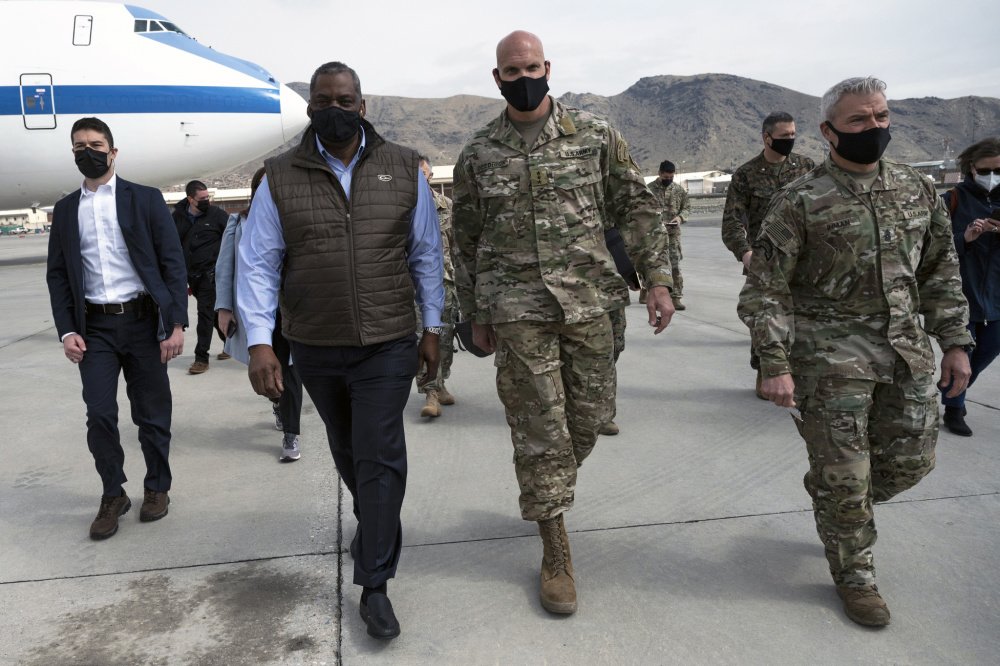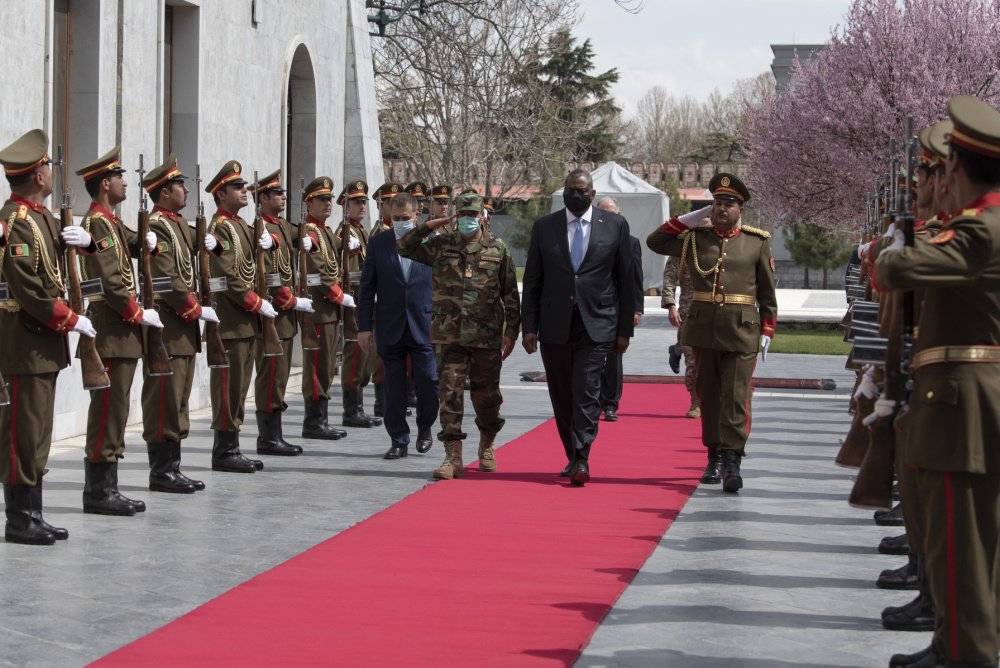Afghan Taliban Threatens To Attack Foreign Troops If Withdrawal Deadline Missed

Secretary of Defense Lloyd J. Austin III walks with the commander of Combined Security Transition Command – Afghanistan, Army Lt. Gen. E. John Deedrick Jr., upon arrival in Kabul, Afghanistan, March 21, 2021. DoD photo by Lisa Ferdinando via DVIDS.
This article was originally published March 26, 2021, by Radio Free Europe/Radio Liberty.
The Taliban has threatened to resume hostilities against foreign troops in Afghanistan if they do not withdraw by May 1 as stipulated in a 2020 deal between the militant group and the United States.
Failure to meet the deadline would be seen as a violation of the agreement signed in Qatar last February, and the Taliban would be “compelled” to continue its “armed struggle against foreign forces to liberate its country,” the insurgents said in a statement on March 26.
The warning comes a day after U.S. President Joe Biden said it would be “hard” to withdraw the last 2,500 U.S. troops from Afghanistan by May 1.

Taliban assaults on foreign troops in Afghanistan have largely ceased since the Doha deal was signed, but attacks have continued against Afghan security forces and government personnel.
Under the accord, all foreign forces are to leave Afghanistan by May in exchange for security guarantees from the militant group such as severing ties with Al-Qaeda and refusing to harbor any foreign terrorists.
The Taliban also pledged to negotiate a cease-fire and a power-sharing deal with Kabul, but the intra-Afghan peace talks, launched in Qatar in September 2020, have bogged down.
The U.S.-led NATO mission in Afghanistan currently has 9,600 troops deployed in the war-torn country.
The Taliban on March 26 said it was committed to the deal, which it termed the “most sensible and shortest path” to end America’s longest war.
Responsibility for its prolongation would “be on the shoulders of those who committed this violation,” the statement said.
Also on March 26, Germany’s lawmakers approved a mandate to allow its troops to stay in the country until January 2022.
In his first press conference since taking office in January, Biden said he does not intend to keep the U.S. troops in Afghanistan “for a long time.”
“We will leave, the question is when we leave,” he said.
Asked whether he envisioned U.S. troops still in Afghanistan in 2022, the president responded: “I can’t picture that being the case.”
Copyright (c)2021 RFE/RL, Inc. Reprinted with the permission of Radio Free Europe/Radio Liberty, 1201 Connecticut Ave NW, Ste 400, Washington DC 20036.

Coffee or Die is Black Rifle Coffee Company’s online lifestyle magazine. Launched in June 2018, the magazine covers a variety of topics that generally focus on the people, places, or things that are interesting, entertaining, or informative to America’s coffee drinkers — often going to dangerous or austere locations to report those stories.
BRCC and Bad Moon Print Press team up for an exclusive, limited-edition T-shirt design!
BRCC partners with Team Room Design for an exclusive T-shirt release!
Thirty Seconds Out has partnered with BRCC for an exclusive shirt design invoking the God of Winter.
Lucas O'Hara of Grizzly Forge has teamed up with BRCC for a badass, exclusive Shirt Club T-shirt design featuring his most popular knife and tiomahawk.
Coffee or Die sits down with one of the graphic designers behind Black Rifle Coffee's signature look and vibe.
Biden will award the Medal of Honor to a Vietnam War Army helicopter pilot who risked his life to save a reconnaissance team from almost certain death.
Ever wonder how much Jack Mandaville would f*ck sh*t up if he went back in time? The American Revolution didn't even see him coming.
A nearly 200-year-old West Point time capsule that at first appeared to yield little more than dust contains hidden treasure, the US Military Academy said.












